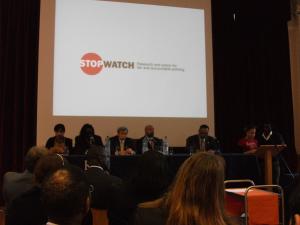Launch of StopWatch (10/18/2010)

Recent studies show that in England and Wales Black people are stopped and searched seven times more than Caucasians; and Asians at twice the Caucasian rate. Jesse Jackson has formed a new coalition of NGO’s and academic societies to combat racial profiling and power abuse in UK policing. The organization, StopWatch, was launched at King’s College in London with an address from Reverend Jesse Jackson followed by a panel discussion.
Jackson didn’t mince words as he began his speech by saying that Britain and the U.S. are cut from the same cloth culturally, but also in their inequality of civil rights. He observed that Britain is seen as an "enlightened" society with high culture districts and universities, but that racial discrimination is alive and well there. He continued his speech saying English police are just as bad as, if not worse than, the U.S. when it comes to abusing their powers, and he warned England to clean up their act before London hosts the 2012 Olympics by saying “don’t let this ugly behaviour blemish your reputation with the whole world watching.”
Similarly, Barron Victor Adebowale expressed concern about the current rise in racial profiling in Britain. He said he has a “horrible fear of déjà vu” from when the south of England was hit with race riots in the 1980s. He warned, “If we don’t discuss this in a civilized, planned, and appropriate way then it will arise; it will bite society in the way it did in the '80s in the riots of Brixton and throughout this country.”
Karen Chouhan, Director of Equanomics, an organization fighting racial inequalities through economics, spoke out against the principle of policing by consent. She said, “I don’t recall consenting to my son being stopped eleven times in eleven months and then being denied a record of the event.” Chouhan went on to say, “What worries me most is when it is normalized that the civil rights of our young people are eroded.”
StopWatch brings together academics and activists in order to research racial discrimination by the police, inform the public about police abuse, and offer alternatives. Their solutions to stopping searches are to establish integrated police cars, by both race and sex, to place cameras in police vehicles; provide mass education to young people about their rights; train police to use different tactics; and encourage community intelligence on the matter.
Throughout the conference, the speakers encouraged community organization not only amongst activists but also in choosing which officers should police which neighborhoods. Jackson argued for a form of Affirmative Action saying, “unless the police reflect the population they are policing they are an archetypal force.” Adebowale candidly responded that Affirmative Action in England in the next five years was as probable as his grandmother landing a UFO on the end of his nose. He credits this lack of policy making to the current conservative party’s control of the UK government. However, he ended on an optimistic note by concluding that the current administration’s focus on a self-sufficient society could lead to more freedom as the activist leaders involved in groups like StopWatch will also step up to lead in their own communities.